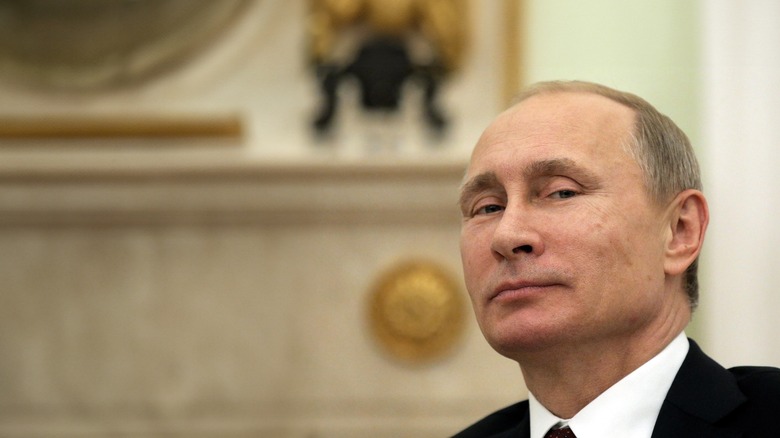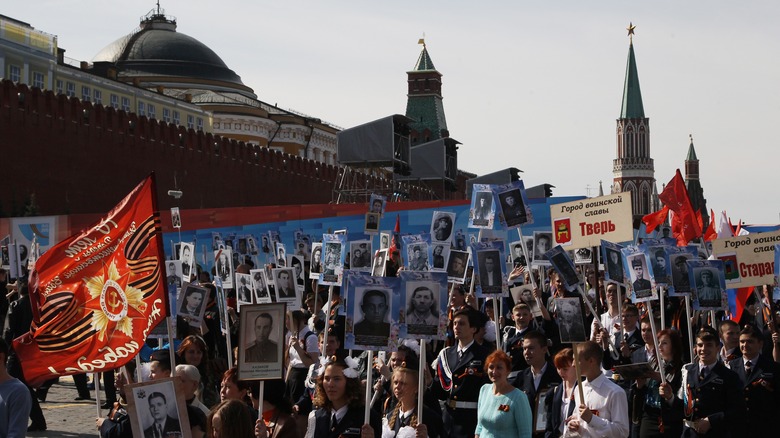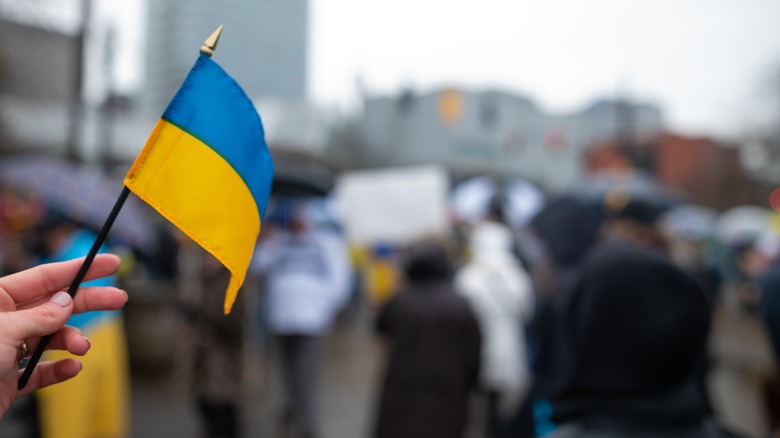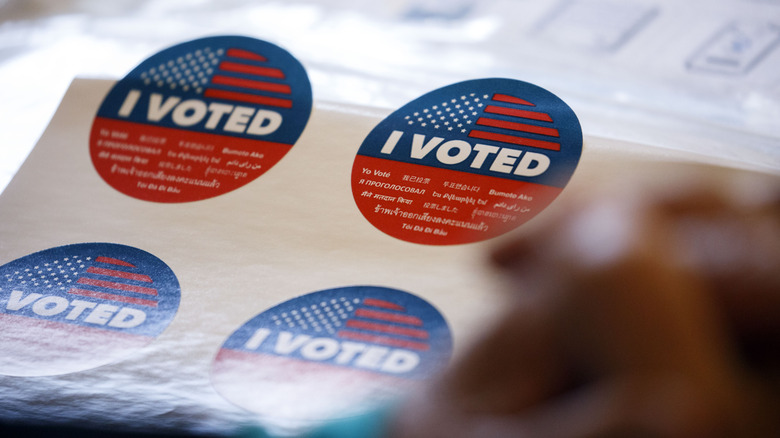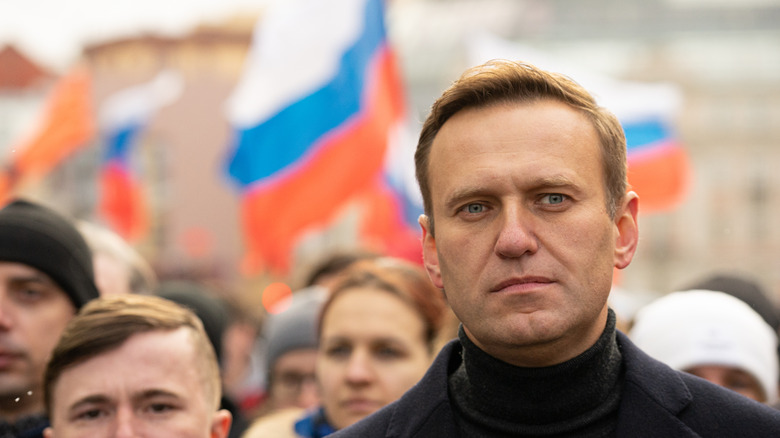Secrets That Vladimir Putin Tried To Hide
The best lies contain truth, it's said. Fewer world leaders embody this statement better than Russian President Vladimir Putin. His 25-year-long reign — the longest since Joseph Stalin — has gotten so shrouded in disinformation, misinformation, half-truths, veiled truths, distractions, and digressions that it's practically impossible to suss out what's real and what's not, especially for Russian citizens. This, too, is part of the game. But sometimes, here and there, information slips through, and secrets see light.
It's likely we'll never know the truth about some questions connected to Putin. The May 2023 drone attack on the Kremlin, for instance, sparked talk of a false flag event when Russian officials blamed it on Ukraine and claimed it was an attempt to assassinate the Russian president. As an individual, there's been lots of talk about Putin's health and his potential battles with Parkinson's and cancer. Such secrets, if true, likely won't be revealed anytime in the near future. And no, it's not a stretch to think that decisions made by the Russian state can't occur without Putin's authorization. We can speak of them in the same breath.
Some secrets that have been revealed are no-brainers, however. Putin manipulates Russian media to control election outcomes, for instance. He also works to undermine Ukrainian war efforts and the European zeitgeist via propaganda. Russia has even meddled with U.S. elections. Other divested secrets are less obvious and even a bit funny, like the spa and Turkish bath on Putin's personal ghost train.
His ghost train with a personal care car
We might as well start with a somewhat comical entry because every other item in this article is very much not funny. To wit: Putin's secret "ghost train." No, he doesn't ride it while having tea with 19th-century specters — it's named so because it's like a phantom as it rides Russia's railways without any mention on official train schedules. Putin's ghost train has been an open secret for years, so much so that he has used it to host transport officials and released photos of meetings onboard, as CNN reported. But, details about the train's design and facilities have remained hush-hush until recently. Those details come to us via defector and former Russian Federal Protective Service (FSO) officer Gleb Karakulov. He delivered his findings to the Dossier Center, a website devoted to exposing criminal activity in the Russian government.
Most interestingly, documents of Putin's no-longer-secret ghost train reveal a series of four rooms focused on health, fitness, and appearance. That's four rooms on one train car out of 20 total cars. The beauty car — as we're dubbing it — contains a general toilet/washing up/changing room, a gym (updated with weight machines from U.S. company Hoist), a massage and skincare room complete with gadgets like a skin-tightening "radio-frequency machine," and a tiled Turkish bath and steam spa with an adjacent toilet. The rooms suppress listening devices, and the train itself comes equipped with wireless communication domes on the roof.
His election rigging
Following the collapse of the Soviet Union in 1991 under the leadership of Mikhail Gorbachev, Russia had a brief flicker of something resembling a democratic state before Vladimir Putin became president in 1999. As AP News outlines, he served two terms until 2008, switched to prime minister, became president again in 2012, changed presidential terms from four years to six years, passed an amendment that allowed him to continue getting reelected, and was reelected for his fifth term in 2024 in a ceremony of pomp and grandeur at Moscow's Grand Kremlin Palace. And big shock: There was no way he wouldn't win.
This time, the disclosed secrets come via Estonian news site Delfi, which passed the information along to multiple European news outlets like France 24 and VSquare. Putin's election plot was complicated, but in a nutshell, it involved a massive information manipulation campaign along multiple media fronts and cost about €1 billion. Documents reveal budget breakdowns and propaganda agendas such as praising "modern [Russian] heroes of whom everyone can be proud," exhorting "traditional values," establishing state-controlled "alternative organizations" to control messaging, and developing a "creative campaign content" focused on things like films and music festivals. The overall objective was to avoid directly altering election results, but "pre-rig" them toward Putin's favor as much as possible.
His European information war
The further we go along the list of disclosed Vladimir Putin secrets — and by extension Russian state secrets — the more you'll likely think, "Is there any reason for such incessant meddling in other country's affairs?" Few collections of data illustrate this question as well as a 277-page FBI dossier. Released to Politico in September 2024, the documents outline the worldwide, ongoing disinformation campaign by Russian intelligence agencies bent on destabilizing the social cohesion of countries like France, Germany, Italy, and the United States. These efforts especially seek to undermine support for Ukraine. Campaign name: Doppelganger.
The dossier describes Putin receiving reports regarding a "media cluster" of "false stories" generated by influencers in "40 to 50 websites per country." Those influencers consist of "Doppelgangers" posing as foreign nationals — "from a Frenchman to a Frenchman!," as one note reads. Russia's "Social Design Agency" heads such projects, which seek to bypass bot filters and target individuals. Falling squarely under the heading of "psyops," these campaigns are designed to evoke "emotional" responses like, "Americans are such scumbags!" and, "Really, why do WE need to help Ukraine?" These campaigns also involve the creation of duplicates of various countries' media sites, like Reuters, Le Monde, Der Spiegel, Delfi, and more.
Overall, the goal was to "escalate internal tensions ... in order to promote the interests of the Russian Federation" and "influence real-life conflicts and artificially create conflict situations." Germany and France were targeted by their own campaign, dubbed, "International Conflict Incitement."
Russian interference in U.S. elections
Next up we've got a secret that many people used to balk at and claim was paranoid nonsense: Russian interference in U.S. elections and civil unity, in general. As part of the FBI effort linked to the aforementioned Russian disinformation campaign in Europe, Politico reported in September 2024 that the U.S. Department of Justice had seized 32 websites that looked like duplicates of The Washington Post and Fox News. They contained false information related to events like the assassination attempt on Donald Trump that same year. According to the outlet, Attorney General Merrick Garland said that these sites "fueled Russian-government narratives or sought to foment division in the U.S." "We have no tolerance for attempts by authoritarian regimes to exploit our democratic system of government," he said at a press conference.
While this crackdown represents a recent effort, the U.S. Senate Select Committee on Intelligence released mountains of formerly secret information related to Russia meddling in the 2016 election. As Time explained in 2019, investigations uncovered Russian propaganda released via YouTube, Instagram, Facebook, Twitter, etc. There were fake rallies in Florida and Pennsylvania, hacks on the Hilary Clinton campaign, infiltration of voter registration software (including the potential alteration of some voter information), attempted hacks on the Republican National Committee, meetings arranged between Russian agents and an unwitting Donald Trump, intelligence on 500,000 voters stolen from databases across multiple states, and much more. In 2018, the FBI released federal warrants for 12 Russian intelligence officers involved in these crimes.
His dead political rivals
The final item on our list is arguably the most disturbing. It's also one of those open secrets reported by numerous sites like Al Jazeera, The Guardian, The Washington Post, Politico, and AP News. Namely, that numerous Russian dissenters have died under mysterious circumstances and were likely assassinated.
Newsweek and Radio Free Europe have lists of such people dating back to 2003. There's Wagner Group head Yevgeny Prigozhin, who died in a plane crash in 2023 after turning his paramilitary organization on Moscow. There are journalists and human rights activists who wanted to expose Russian corruption, a Russian oligarch, and political rivals who cried for democracy and transparency. Journalists Stanislav Markelov and Anastasia Baburova were shot site-by-side in 2009. Journalist Anna Politkovskaya was shot in her apartment. Former prime minister and opponent to the Russian invasion of Crimea Boris Nemtsov was shot on a bridge. Former security agent and defector Aleksandr Litvinenko drank tea laced with radioactive polonium-210. Journalist Yuri Shchekochikhin died of a mysterious illness. On and on it goes.
Most recently, prominent Putin political opponent Aleksey Navalny died behind bars. Reuters reports that authorities told his mother he died from "sudden death syndrome." State-monitored website Russia Today — recently charged by the U.S. Department of Justice for pushing Russian propaganda — reported that it was a blood clot, citing an unnamed source. The U.S. Embassy in Georgia reports that Navalny was poisoned with a nerve agent in 2020 — the same one the Russian military intelligence service (GRU) used to assassinate Russian double agent Sergei Skripal in 2018.
